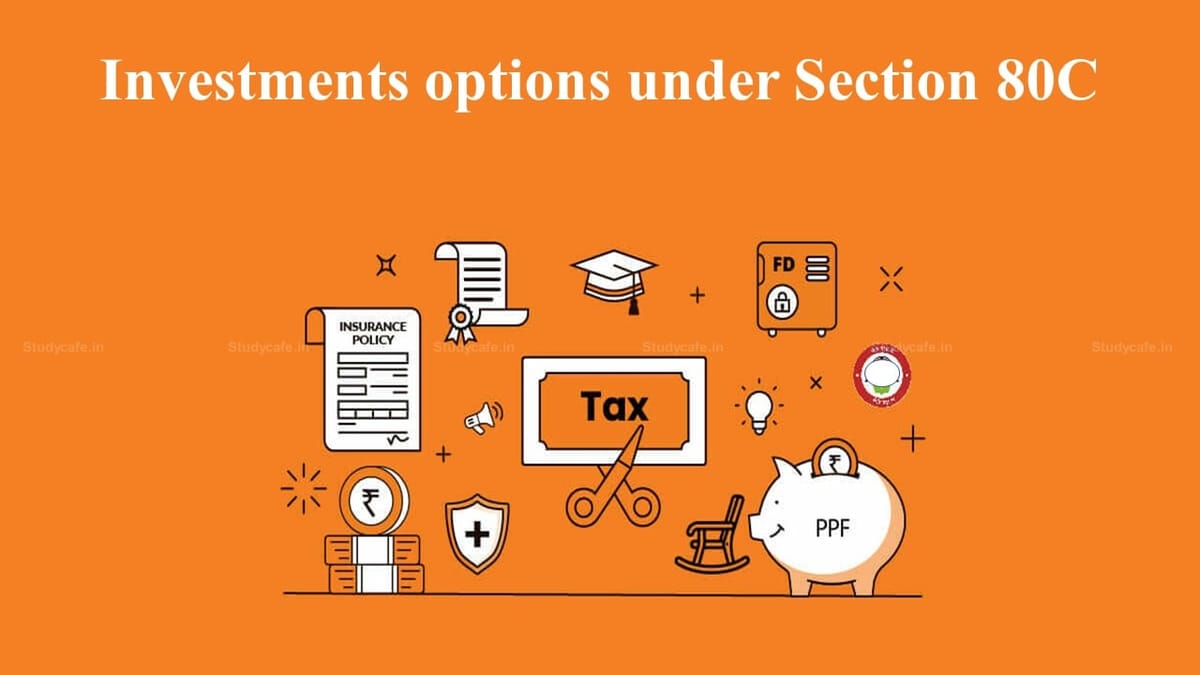11 Most Popular Investments options under Section 80C
Deepshikha | May 10, 2022 |

11 Most Popular Investments options under Section 80C
The most commonly used section for seeking Income Tax Deductions is Section 80C. This section enables a deduction of Rs. 1,50,000, applies to all taxpayers, regardless of their income source.
Investments in certain specified instruments are eligible for a deduction from total taxable income, which can be claimed under Section 80C. Section 80C allows you to claim a maximum deduction of Rs. 1,50,000.
This deduction of Rs. 1,50,000 can be claimed for a single investment or numerous investments. Only Rs. 1,50,000 would be permitted as a total cumulative deduction.
A person can invest in a variety of instruments and claim a deduction under Section 80C. The following are the eleven most popular investments that can be claimed as a deduction under Section 80C.
Investments in Equity Linked Mutual Funds are also eligible for a Section 80C deduction. It is important to remember that the deduction is only available for Equity Linked Mutual Funds, commonly known as ELSS Funds, and not for other Mutual Funds. These funds also have the words – Tax Saving on them.
These funds can be kept in a Demat Account or Physical Form. You can also buy them via an agent if you specify the Demat Account Number where you want the Mutual Fund Investment to be deposited. Some online stock trading accounts also allow users to buy mutual funds online.
These Equity Linked Mutual Funds have a three-year lock-in period, which means you can’t sell them before three years have passed since you bought them.
Section 80C allows you to deduct the life insurance premiums you pay to insure the lives of yourself, your spouse, and your children.
It is important to remember, however, that the life insurance premiums paid to insure the lives of parents are not allowed to be deducted.
Anyone, salaried or not, can invest in a PPF account and earn a fixed rate of interest. The rate of interest on PPF accounts is set by the government and changes at regular periods. PPF Account interest rates are normally slightly higher than Fixed Deposit interest rates.
PPF accounts are opened for 15 years with a 5-year lock-in period. After the fifth year, you can remove a set amount from your PPF account without incurring any prepayment penalties.
Employee Provident Fund is a retirement savings plan that is only offered to salaried employees. Both the employer and the employee invest a specified amount each month, and interest is paid on the amount in the EPF Account at regular periods.
The amount paid as Stamp Duty on the acquisition of a home and the amount paid on document registration can both be deducted in the year of purchase.
The repayment of the principal part of a home loan is also eligible for a deduction under Section 80C. Interest on a home loan is not deductible under this section, although it is deductible under Section 24.
The Government of India issues National Savings Certificates (also known as NSCs), which are fixed-income earning products. There are two varieties of NSCs: one with a 5-year duration and the other with a 10-year length.
Any of the above two types of NSCs are eligible for a Section 80C deduction.
Investment in a 5-year fixed deposit is also eligible for a Section 80C deduction. It is important to remember that this does not apply to all fixed deposits, but only to those with a term of more than 5 years.
You must tell your banker that you are making the fixed deposit to save money on taxes when you make it.
The Senior Citizen Savings Scheme is a fixed-income investment that pays interest regularly. Senior Citizen Savings Accounts can be opened at any post office in India, as well as at several Nationalized and Private Bank locations.
Under Section 80C, the money invested in the Sukanya Samriddhi Yojana for the welfare of a girl child is deductible. The money paid on the Sukanya Samriddhi Yojana is quite lucrative, and it is also tax-free because the income received on this account is not taxed.
School fees for up to two children are also eligible for a deduction under Section 80C. This deduction is available for fees paid for the full-time education of children in India in the fiscal year in which the payment is made.
Fees paid for part-time courses, coaching sessions, or education outside India are not eligible for a Section 80C deduction.
In case of any Doubt regarding Membership you can mail us at [email protected]
Join Studycafe's WhatsApp Group or Telegram Channel for Latest Updates on Government Job, Sarkari Naukri, Private Jobs, Income Tax, GST, Companies Act, Judgements and CA, CS, ICWA, and MUCH MORE!"